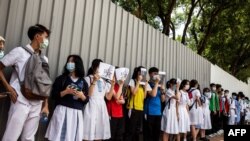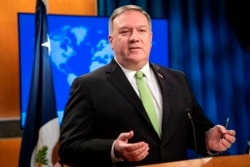Top diplomats from the United States and China are planning for a closed-door meeting Wednesday in Honolulu, as anti-U.S. propaganda from China’s state-controlled media outlets intensifies, exacerbating rising tensions between the two countries.
The planned one-day meeting between Secretary of State Mike Pompeo and Chinese Politburo Member Yang Jiechi, would take place ahead of the U.S.-Russia arms-control talks in Vienna, scheduled to start June 22. In Honolulu, the U.S. is expected to renew its call for China to join three-way arms control talks.
Politico first reported Pompeo was quietly planning a trip to Hawaii to meet with Chinese officials.
A diplomatic source told VOA that China had requested the meeting.
The U.S. is described as “unenthusiastic” about the meeting, after Beijing officials used the George Floyd protests to accuse the Trump administration of a double standard when it criticized China’s crackdown on Hong Kong pro-democracy protesters.
Senator Rick Scott, a Florida Republican, said he does not trust Communist China’s intentions, nor does he think they’re acting in good faith.
“Until Communist China agrees to be transparent, fulfill the obligations under the Phase 1 trade deal, and stop violating human rights, stealing from the U.S., militarizing the South China Sea, taking away the rights of those in Hong Kong and threatening Taiwan, they will never be a trustworthy partner to the United States. We have to remember that Communist China never lives up to their agreements,” Scott told VOA Mandarin.
The planned meeting comes as the U.S. is trying to deter China from implementing a new national security law in Hong Kong that would erode the territory’s rights and freedoms under the Basic Law. While it’s unlikely that Washington can compel Beijing to not enact the legislation, the specific implementation remains open-ended, and this is likely where the U.S. can still exert pressure.
“You can imagine which [Hong Kong] will be the issue of dialogue between China and U.S.,” said EU High Representative Josep Borrell after a virtual meeting with Pompeo on Monday morning. Borrell was asked by a reporter following his video conference with Pompeo where the EU stands regarding the new Hong Kong national security law.
“For us, it's important to stay together with the U.S. in order to share concerns and look for a common ground to defend our values and our interests,” Borrell said.
Substantial U.S.-China diplomatic and security talks have been in limbo for more than a year. The two countries last met for their annual U.S.-China Diplomatic and Security Dialogue on November 9, 2018.
Some analysts said the Honolulu meeting is unlikely to defuse the rising tensions that have been building over many issues including COVID-19, trade, Hong Kong, Taiwan and South China Sea, pushing the bilateral relationship to its worst in decades.
“China prefers to dial down the heated rhetoric,” Brett Bruen, former White House Global Engagement Center director under the Obama administration, told VOA.
“That allows them to continue the crackdown on Hong Kong, and subtle, but significant disinformation efforts on their responsibility for COVID-19.”
“They also know [U.S. President Donald] Trump is facing a tough reelection and needs ‘wins,’ so they will try to dangle out some new billion-dollar purchases of American products in exchange for the White House easing up on their critique,” Bruen added.
Others said the Chinese Communist Party (CCP) is “out of options.”
“They are probably concerned about their economy,” retired U.S. Air Force Brigadier General Robert Spalding, who served on President Trump’s National Security Council, told VOA. “Their banking system is a mess. Manufacturers are fleeing,”
Nuclear arms talks
Next week, top officials from the U.S. and Russia plan to meet in Vienna to discuss nuclear arms reduction negotiations.
“China also invited. Will China show and negotiate in good faith?” asked U.S. Special Presidential Envoy for Arms Control Marshall Billingslea in a tweet. Billingslea said he and Russian Deputy Foreign Minister Sergei Ryabkov have agreed to meet for nuclear arms negotiations.
Today agreed with the Russian Deputy Foreign Minister Ryabkov on time and place for nuclear arms negotiations in June. China also invited. Will China show and negotiate in good faith?
— Ambassador Marshall S. Billingslea (@USArmsControl) June 8, 2020
The Trump administration has voiced a general interest in preserving the New START (Strategic Arms Reduction Treaty), which obliges the United States and Russia to halve their inventories of strategic nuclear-missile launchers. The treaty expires in February 2021.
U.S. officials are hoping to negotiate a three-way deal that brings Beijing into a new arms-control framework. China, whose nuclear arsenal remains significantly smaller than those of Moscow and Washington, has declined to join the trilateral talks.
A source from a hotel in Honolulu’s Waikiki Beach said the Chinese delegation is currently expected to check out on June 18 (Thursday.)
How the Chinese officials are complying with a local quarantine requirement during the coronavirus outbreak remains unclear.
A statewide order by Hawaii Governor David Ige requires a mandatory 14-day quarantine for all visitors arriving after March 26, 2020. The order says the designated quarantine location is the hotel room or rented lodging of visitors.
The Chinese Embassy in Washington, D.C. did not respond to a request for comment on the planned meeting or how Chinese officials are complying with the mandatory quarantine.
Pompeo and Yang last met in New York in a closed meeting in August 2019.
VOA Mandarin's Yihua Lee contributed to this report.





